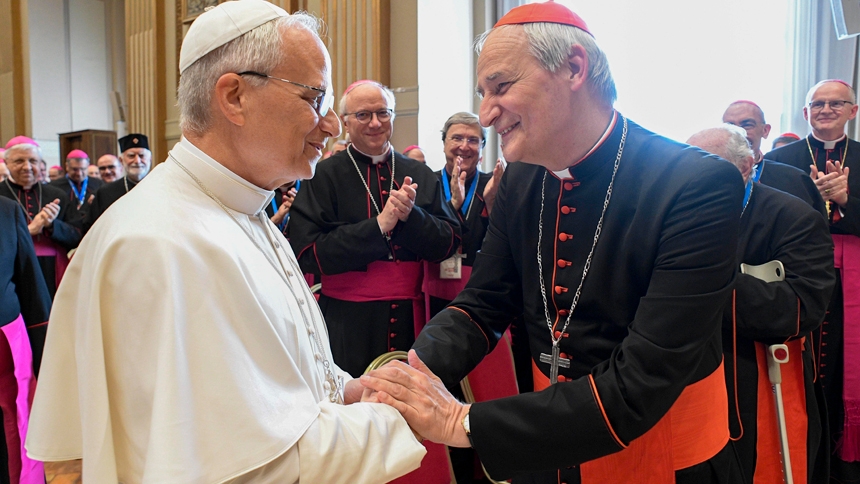
Above: Pope Leo XIV greets Cardinal Matteo Zuppi of Bologna, president of the Italian bishops' conference, during a meeting with about 200 conference members in the Hall of Blessings at the Vatican June 17, 2025. (CNS photo/Vatican Media)
VATICAN CITY (CNS) -- Finding more effective ways to proclaim the Gospel, educate for peace, defend human dignity and promote dialogue are key challenges to living the faith and building the kingdom of God today, Pope Leo XIV said.
"Look to the future with serenity and do not be afraid of making courageous choices," the pope told some 200 Italian bishops June 17 during a meeting in the Hall of Blessings at the Vatican.
"No one can prevent you from staying close to the people, from sharing their lives, from walking with the least (and) from serving the poor," the pope said. "No one can stop you from proclaiming the Gospel, and it is the Gospel we are called to bring because it is this that everyone -- ourselves first of all -- needs to live well and to be happy."
Cardinal Matteo Zuppi of Bologna, president of the Italian bishops' conference, told Pope Leo that "it has been and is our commitment to give an accounting of the hope that is in us, to be a welcoming church, close to the expectations of many, of all, particularly the poor."
Pope Leo told the bishops, "Proclaiming the Gospel, peace, human dignity, dialogue: These are the coordinates through which you can be church that embodies the Gospel and is a sign of the kingdom of God."
To do so effectively, he said, Christ must be at the center of their lives and their outreach as they try to address confusion, a distancing from the church and other challenges "related to secularism, a certain disaffection with the faith and the demographic crisis."
Responding effectively, he said, requires "discerning ways to bring the Good News to everyone with pastoral action capable of reaching those who are most distant and doing so with suitable tools for renewing catechesis and the language of proclamation."
Following Jesus also means developing "a pastoral focus on the theme of peace," Pope Leo told the bishops. "Indeed, the Lord sends us into the world to bring his same gift: 'Peace be with you,' and to become its creators in everyday life."
Anywhere that "human and social relationships become difficult and conflict takes shape, perhaps subtly, a church capable of reconciliation must make herself visible," the pope said, encouraging every diocese to "promote pathways of education in nonviolence," mediation initiatives in local conflicts, and "projects that transform fear of the other into an opportunity for encounter."
"Peace is not a spiritual utopia," Pope Leo said. Rather, "it is a humble path, made up of daily gestures that interweave patience and courage, listening and action, and which demand today more than ever our vigilant and generative presence."
Believing and living as Christians also means defending human dignity whenever it is attacked, the pope said.
"Artificial intelligence, biotechnologies, data economy and social media are profoundly transforming our perception and our experience of life," he said. "In this scenario, human dignity risks becoming diminished or forgotten, substituted by functions, automatism, simulations."
"But the person is not a system of algorithms: he or she is a creature, relationship, mystery," Pope Leo said. "Without lively reflection on the human being -- in his or her corporeality, vulnerability, thirst for the infinite and capacity for bonding -- ethics is reduced to a code and faith risks becoming disembodied."

